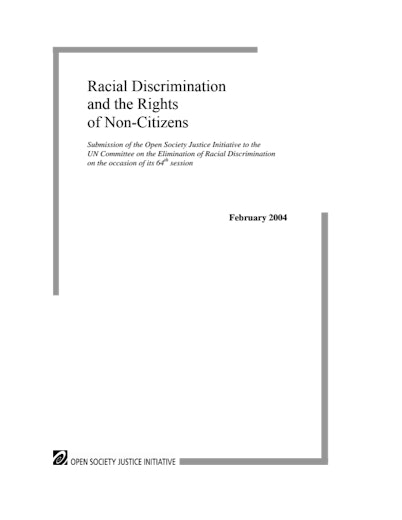Racial Discrimination and the Rights of Noncitizens
The Open Society Justice Initiative submitted Racial Discrimination and the Rights of Non-Citizens, a comprehensive report on the global link between racial discrimination and the rights of noncitizens, to the UN Committee on the Elimination of Racial Discrimination, on the occasion of its thematic session on the rights of noncitizens, held March 1-2, 2004.
The human rights of noncitizens are increasingly under threat. In the wake of September 11, 2001, restrictions on the rights to asylum and the rights of migrants have accelerated in many countries, with countless individuals falling victim to arbitrary detention and violent acts at the hands of state agents. Denationalization and arbitrary or discriminatory access to citizenship are also growing problems, producing massive displacement and rendering stateless people who have never crossed an international border.
Excluded from most democratic political processes, noncitizens do not have a voice in the making of public policy. They do not enjoy an absolute right of residency in the country in which they live, and often lack access to protective legal mechanisms. The legal status and treatment of noncitizens test traditional notions of state sovereignty at their intersection with evolving human rights norms. In the words of the late Arthur Helton:
"Human rights law, it is often argued, touches governments at their most sensitive point: How they exercise power over their own citizens. While this is true, it fails to acknowledge the significance of international human rights law in relation to noncitizens. The protection of noncitizens by international human rights instruments represents an even greater challenge to national sovereignty."
The particular vulnerabilities of noncitizens are compounded by the fact that many are also racial or ethnic minorities.
The first part of this submission underscores the close links between racial discrimination and discrimination based on citizenship status in the enjoyment of fundamental human rights. International law prohibits racial discrimination more clearly and forcefully than citizenship-based distinctions. Given the frequent correlation of these phenomena, it should not be surprising that citizenship-based distinctions commonly serve as a pretext for racial discrimination. The committee has a critical role to play in piercing the veil of impunity that frequently shields acts of racial discrimination against noncitizens from sanction.
The following two sections discuss manifestations of racial discrimination in the granting and deprivation of citizenship. In each of these areas, the coincidence of citizenship-based and racial discrimination serves to obscure convention violations and frustrate the search for effective remedies. Section II describes instances of racial discrimination in access to citizenship, in violation of Article 5(d)(iii) of the Convention, through the placement of administrative obstacles in the path to gaining effective nationality, effectively disenfranchising entire segments of the population. Section III documents cases of racial discrimination in the arbitrary deprivation of citizenship, also in violation of Article 5(d)(iii), by amending laws or changing state practice so as to take away citizenship from individuals who previously enjoyed it, often rendering them stateless.
Topics
- Climate Justice
- Digital Rights and Fair Elections
- Discrimination and Racial Justice
- International Crimes
